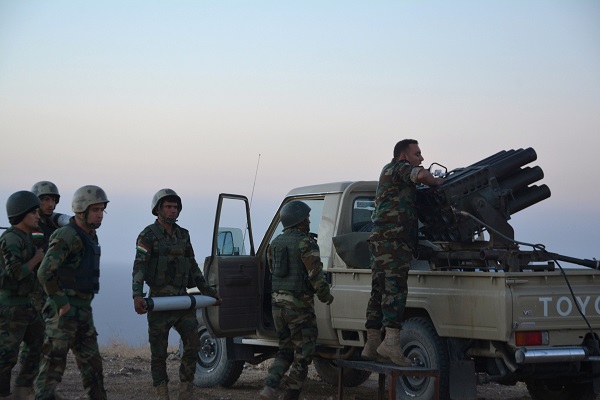
Peshmerga forces gather in the east of Mosul to attack Islamic State militants in Mosul, Iraq, October 17, 2016. REUTERS/Stringer
By: Carla Babb, Jamie Dettmer, & Lisa Bryant
Source: VOA News
WASHINGTON – Iraq’s prime minister, Haider al-Abadi, says the operation to retake Mosul from the Islamic State is going much faster than expected.
He spoke in Paris, where foreign ministers from Western and Middle Eastern nations have been meeting to discuss how to restore peace and stability once the terror group is ousted from Iraq’s second-largest city.
“The forces are pushing toward the town more quickly than we thought and more quickly than we had programmed in our campaign plan,” Abadi said.
On Wednesday, the U.S. general running the coalition ground campaign in Iraq urged Iraqi forces fighting for Mosul not to “go so fast that they start to give opportunity to the enemy.”
“I’m not telling the Iraqis not to rush to Mosul. I’m telling them, ‘You’ve got the momentum, sustain the momentum, continue to put unrelenting pressure on the enemy and then the enemy is going to break,’” Maj. Gen. Gary Volesky told reporters via teleconference from Baghdad.
The general said he expects IS militants to fight with a “full-fledged conventional defense in Mosul” until they lose the city. After that, he said, IS will turn into more of an insurgent force, using unconventional methods to make harassing attacks on Iraqis forces and civilians.
The U.S. has provided intelligence, logistics support, Apache helicopters, artillery fire and thousands of airstrikes to support the fight for Mosul. However, that fight is not the general’s sole focus. Volesky said some of his American forces are intentionally in other areas of Iraq to prevent any potential Islamic State efforts to shift the Iraqi government’s interest to the country’s south.
Refugee crisis
Meanwhile, the international charity Save the Children said thousands of people have fled the Mosul area to escape the unfolding offensive by Iraqi and Kurdish forces.
The aid group said about 5,000 people have arrived in the past 10 days at a refugee camp over the border in Syria, which risks being overwhelmed as more people flee.
On Tuesday, Iraqi and Kurdish leaders told Filippo Grandi, the U.N.’s refugee commissioner, that aid groups would do their best to protect civilians. But, he told reporters in the Kurdistan capital of Irbil, “The protection of the civilians in Mosul cannot be just the responsibility of a few humanitarian organizations.”
The United Nations and the government have support materials for up to 400,000 displaced people in the fight for Mosul. At least 1 million civilians are estimated to be in the city.
Unpredictable IS fighters
Militants have fanned out in Mosul, and residents contacted by phone say the center is eerily quiet, with most people hunkered down waiting for the full storm to hit. U.S.-led coalition and Iraqi warplanes have avoided launching airstrikes in residential areas in a bid to reduce civilian casualties.
Residents, who say they fear venturing out, report IS fighters are behaving more brutally and unpredictably than before.
“There have been two public executions in my neighborhood since Sunday,” said Salim, a shopkeeper and father of two. He said the militants move around in small groups, mainly on motorbikes.
The jihadists also are continuing with preparations to defend the city center, blocking roads with mounds of dirt and erecting other makeshift barriers. IS fighters bombed two buildings inside Mosul, Kurdish officials reported.
On Tuesday, the terror group’s propagandists posted online two videos: one seeking to depict a city unaffected by war, using old footage showing locals shopping on bustling streets, and another showing armed jihadists patrolling streets and a masked militant threatening America.
On the battlefield, though, the taunts would seem to be misplaced.
Popular mobilization force
The terror group has lost more than two dozen villages on the outskirts of Mosul, the Islamic State’s last major urban stronghold in Iraq, since Iraqi security forces in the south and Kurdish peshmerga fighters in the east launched their long-awaited offensive Monday.
The going has been quicker than Iraqi and U.S. commanders claim they expected, and morale on the ground reportedly remains high. Even so, officials are tamping down expectations of a speedy defeat of the terror group as Iraqi and Kurdish forces contend with its roadside bombs, snipers, suicide bombers and hit-and-run attacks.
IS has an estimated 3,000 to 5,000 fighters in Mosul, and U.S. officials describe them as zealous and battle-hardened.
U.S. officials have stressed that the more than 100 embedded American forces will remain with their Iraqi and peshmerga counterparts. The U.S. troops are involved in coordinating and decision making, rather than at the front lines of combat. But U.S. Defense Secretary Ash Carter has said American troops are still in harm’s way.
The fighting has remained on Mosul’s outskirts. The Kurdish peshmerga have been slowing or pausing their advance to allow Iraqi Security Forces units to leap-frog ahead of them. Iraqi officials say only ISF will enter the mainly Sunni Muslim city, but some members of the Shi’ite popular mobilization force (PMF) insist they will, too.
Volesky, the general, stressed Wednesday that the U.S.-led coalition is not supporting the Shi’ite PMF.
VOA U.N. correspondent Margaret Besheer contributed to this report. Lisa Bryant reported from Paris.



